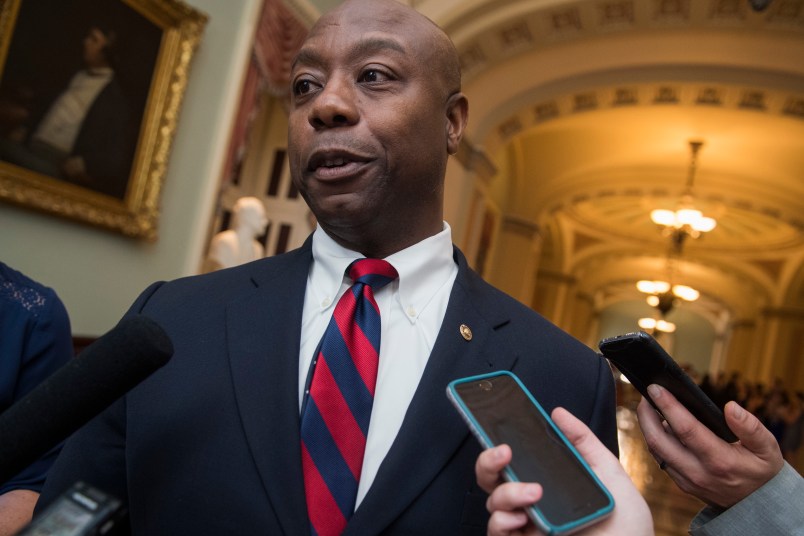Senate Republicans, as they headed into a lunch where they’d learn from GOP leadership how they would be proceeding in their Obamacare repeal efforts, were already spinning the emerging “skinny repeal” plan that may be the final bill they vote on as a success, after failing to settle on a replacement bill.
“Progress is progress,” Sen. Tim Scott (R-SC) told reporters before the lunch. He said would still prefer more substantial legislation to dismantle the Affordable Care Act, but that “eliminating the individual mandate would be a good thing.”
Seeking to claw their way out of a quagmire where neither the Obamacare replacement legislation the Senate has been working on nor a backup repeal-and-delay modeled on 2015 legislation would get enough votes to pass, Senate sources were floating the possibility that Republicans instead would vote on a so-called “skinny repeal,” a narrow set of repeal proposals on which Republicans mostly agree. Medicaid would go untouched under such a measure, so would the Affordable Care Act’s insurers regs, which conservatives were seeking to gut in order to lower premiums.
From a policy level, a skinny repeal that merely eliminated Obamacare’s individual and employer mandates, and some of its taxes would be a disaster for the individual market. Senate Republicans are hoping that by getting something out the Senate, they can come up with a better plan during the process to conference with the House-passed replacement bill.
“If we can just get to conference, we might be able to resolve this whole thing. Who knows?” Sen. Orrin Hatch (R-UT), whose Finance Committee has jurisdiction over the bulk of Obamacare, told reporters.
Sen. Mike Rounds (R-SD) said he was supportive of skinny repeal as a “last resort.”
“If we had to get to the next step, yeah,” Rounds told reporters. “Because, what we do know is we can’t simply walk away from trying to repair this product.”
He said that the proposal he’d seen came with a two-year delay.
Sen. Rand Paul (R-KY), who has been extremely critical of the repeal efforts for not going far enough, defended the skinny repeal idea as “a result that’s pretty fair in the sense that there are different alternatives and different opinions in the caucus.”
The first initial hurdle for the skinny repeal plan is a procedural vote slated for later Tuesday. During two or so days of debate, lawmakers will consider a bevy amendments and competing health care proposals. If both the 2015 repeal-and-delay bill and the Senate replacement legislation fail in votes during the amendment process, it is believed that a skinny repeal bill that eliminates the mandates and the medical device tax will serve as the base for the final bill that the Senate votes on later this week.







Next up: “We saved the day! We’re only eliminating health insurance for 15M instead of 24M. Thanks us for our kindness!!!”
“Because, what we do know is we can’t simply walk away from trying to repair this product.”
So, we will break it. And do it before we figure out how we’ve broken it.
And lots and lots of republicans saying “It’s only fair to give this bill the airing and debate it deserves.”
Because, of course, that always matters to them.
Orrin Hatch’s comment is telling, “Who knows?” In no reasonable society should that description be acceptable as a legislator’s response to something that is 1/6 of the country’s economy.
Leadership!